Business Environment of Sainsbury's: Objectives, Impacts & Analysis
VerifiedAdded on 2023/01/03
|16
|4329
|431
Report
AI Summary
This report provides a comprehensive analysis of Sainsbury's business environment, examining both internal and external factors that influence its operations. The analysis begins by outlining different types of organizations and their legal structures, focusing on Sainsbury's as a limited company. It explores the relationship between organizational structure, size, scope, and objectives, highlighting how functional departments within Sainsbury's are interrelated and impact the company's goals. The report then delves into a detailed internal and macro analysis of Sainsbury's, identifying strengths, weaknesses, opportunities, and threats (SWOT). Contemporary examples illustrate the critical impacts of macro environmental factors on Sainsbury's business operations and decision-making processes. The report concludes by evaluating how both macro and micro factors affect Sainsbury's business objectives and strategic choices. Desklib offers a variety of solved assignments and past papers for students.
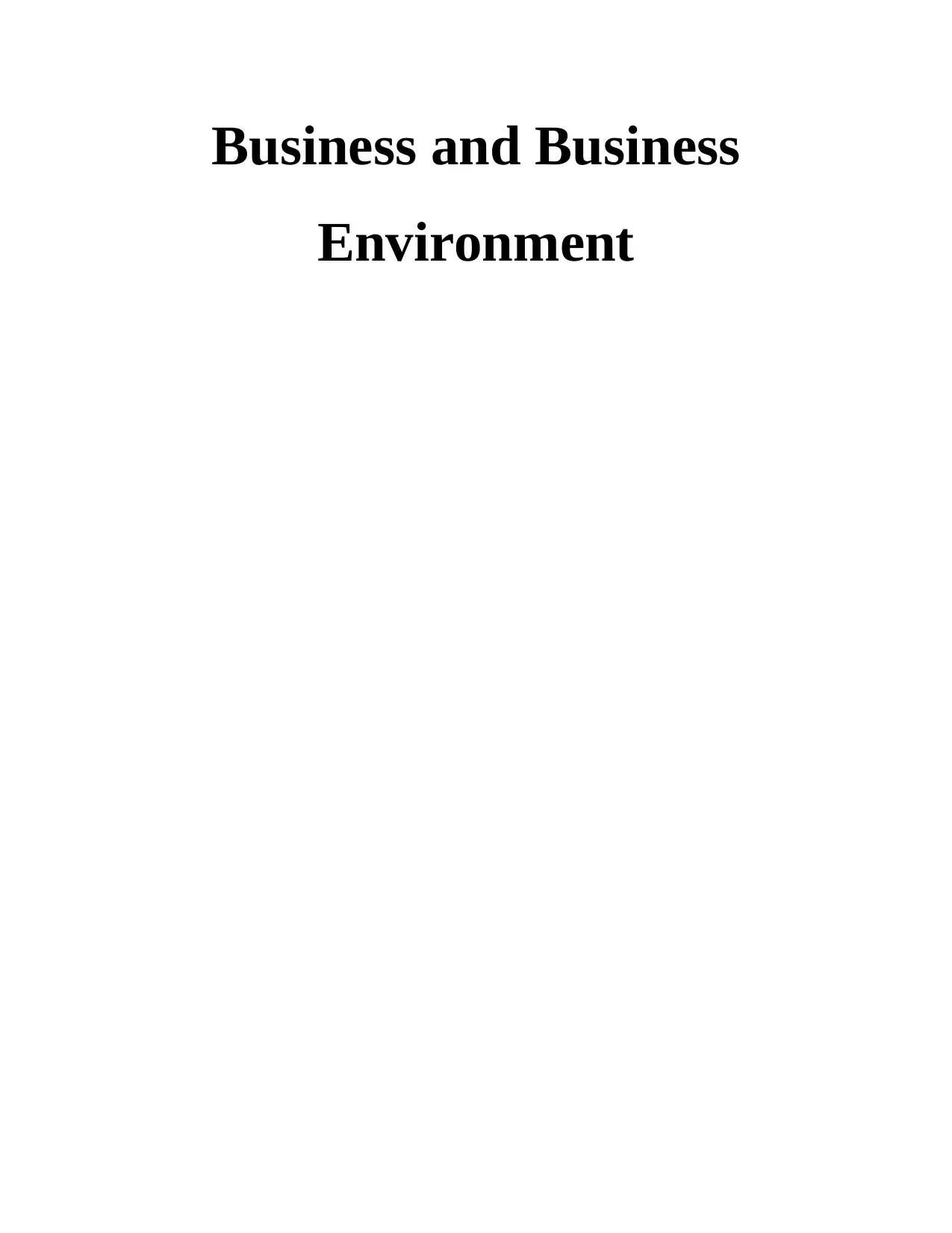
Business and Business
Environment
Environment
Paraphrase This Document
Need a fresh take? Get an instant paraphrase of this document with our AI Paraphraser
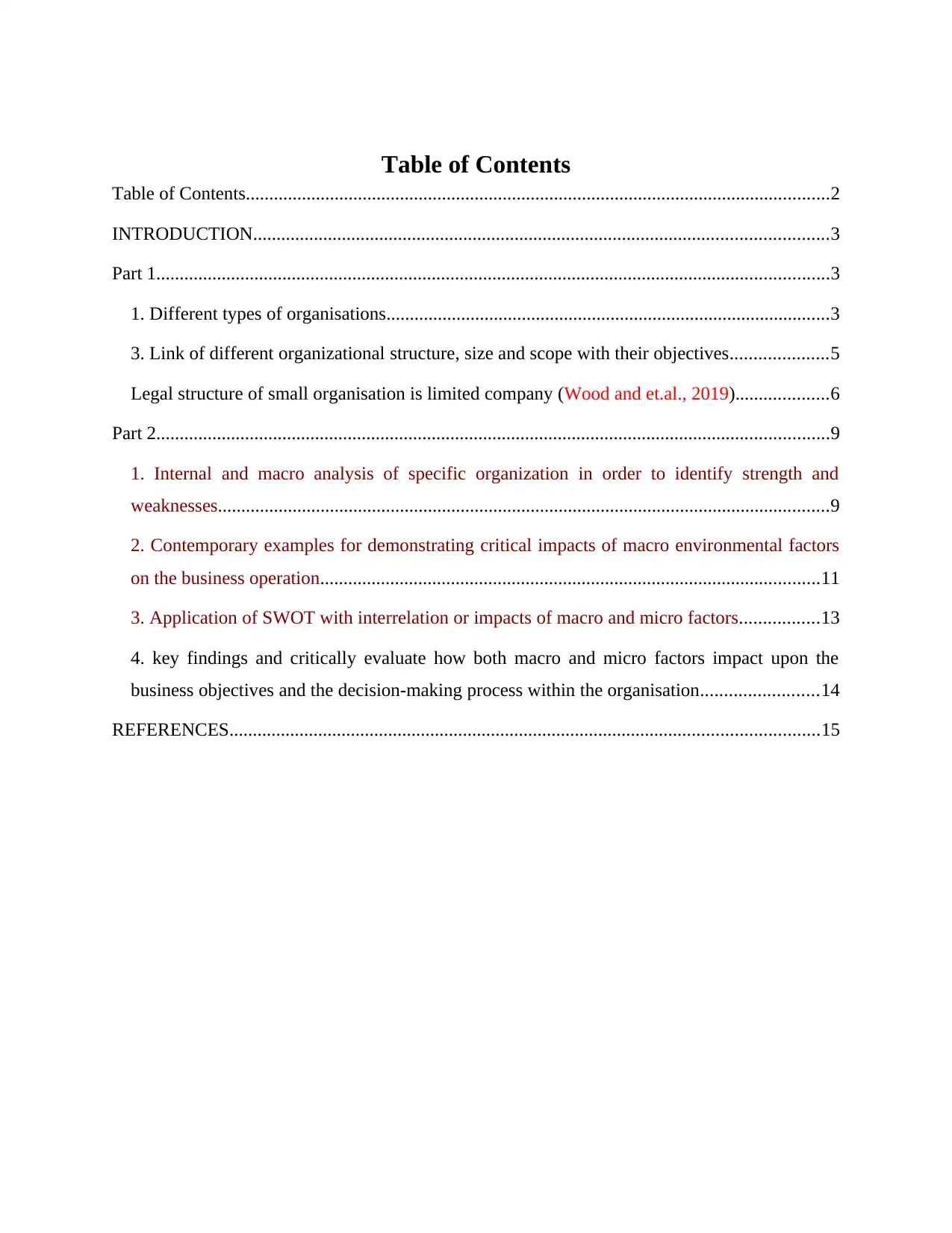
Table of Contents
Table of Contents.............................................................................................................................2
INTRODUCTION...........................................................................................................................3
Part 1................................................................................................................................................3
1. Different types of organisations...............................................................................................3
3. Link of different organizational structure, size and scope with their objectives.....................5
Legal structure of small organisation is limited company (Wood and et.al., 2019)....................6
Part 2................................................................................................................................................9
1. Internal and macro analysis of specific organization in order to identify strength and
weaknesses...................................................................................................................................9
2. Contemporary examples for demonstrating critical impacts of macro environmental factors
on the business operation...........................................................................................................11
3. Application of SWOT with interrelation or impacts of macro and micro factors.................13
4. key findings and critically evaluate how both macro and micro factors impact upon the
business objectives and the decision-making process within the organisation.........................14
REFERENCES..............................................................................................................................15
Table of Contents.............................................................................................................................2
INTRODUCTION...........................................................................................................................3
Part 1................................................................................................................................................3
1. Different types of organisations...............................................................................................3
3. Link of different organizational structure, size and scope with their objectives.....................5
Legal structure of small organisation is limited company (Wood and et.al., 2019)....................6
Part 2................................................................................................................................................9
1. Internal and macro analysis of specific organization in order to identify strength and
weaknesses...................................................................................................................................9
2. Contemporary examples for demonstrating critical impacts of macro environmental factors
on the business operation...........................................................................................................11
3. Application of SWOT with interrelation or impacts of macro and micro factors.................13
4. key findings and critically evaluate how both macro and micro factors impact upon the
business objectives and the decision-making process within the organisation.........................14
REFERENCES..............................................................................................................................15
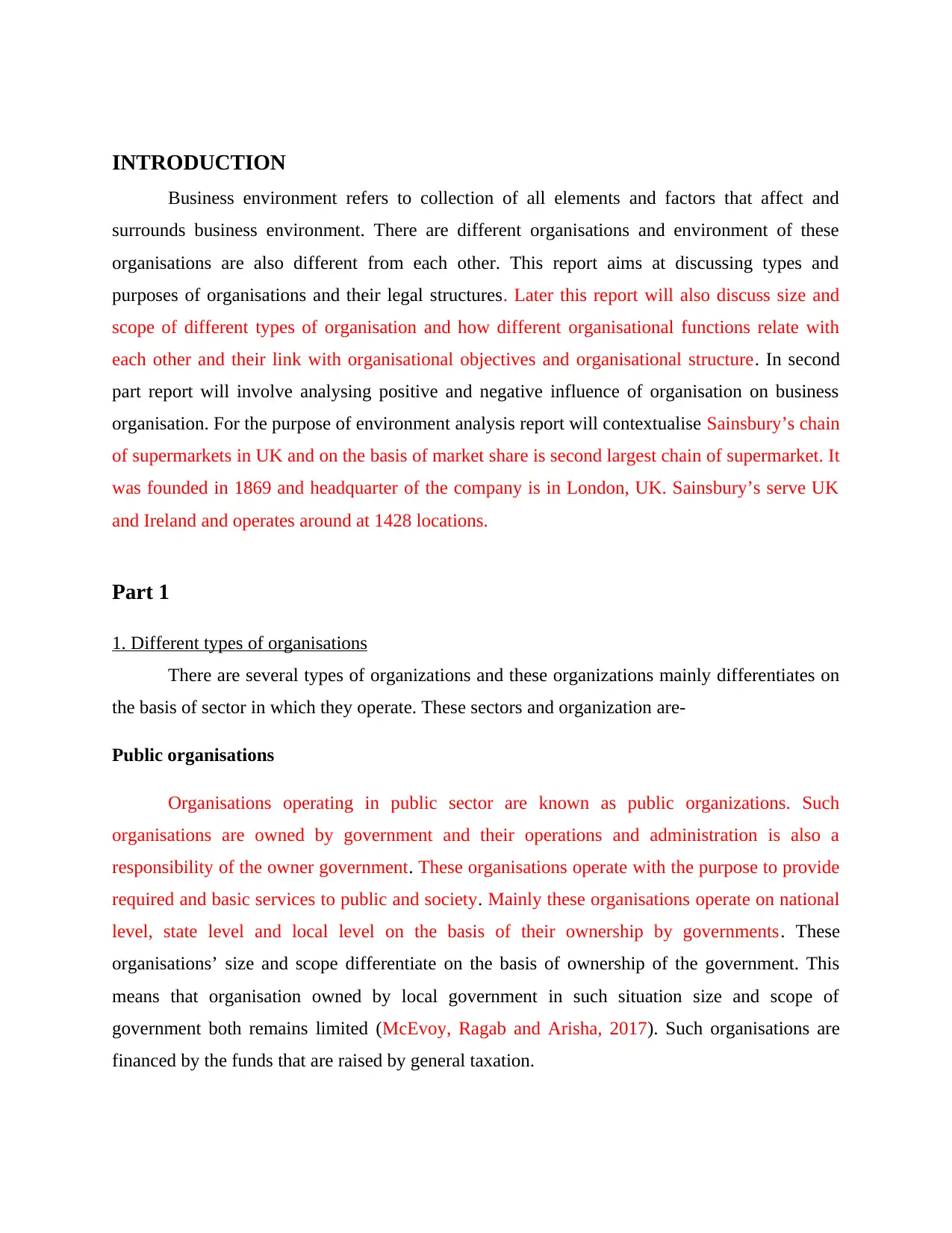
INTRODUCTION
Business environment refers to collection of all elements and factors that affect and
surrounds business environment. There are different organisations and environment of these
organisations are also different from each other. This report aims at discussing types and
purposes of organisations and their legal structures. Later this report will also discuss size and
scope of different types of organisation and how different organisational functions relate with
each other and their link with organisational objectives and organisational structure. In second
part report will involve analysing positive and negative influence of organisation on business
organisation. For the purpose of environment analysis report will contextualise Sainsbury’s chain
of supermarkets in UK and on the basis of market share is second largest chain of supermarket. It
was founded in 1869 and headquarter of the company is in London, UK. Sainsbury’s serve UK
and Ireland and operates around at 1428 locations.
Part 1
1. Different types of organisations
There are several types of organizations and these organizations mainly differentiates on
the basis of sector in which they operate. These sectors and organization are-
Public organisations
Organisations operating in public sector are known as public organizations. Such
organisations are owned by government and their operations and administration is also a
responsibility of the owner government. These organisations operate with the purpose to provide
required and basic services to public and society. Mainly these organisations operate on national
level, state level and local level on the basis of their ownership by governments. These
organisations’ size and scope differentiate on the basis of ownership of the government. This
means that organisation owned by local government in such situation size and scope of
government both remains limited (McEvoy, Ragab and Arisha, 2017). Such organisations are
financed by the funds that are raised by general taxation.
Business environment refers to collection of all elements and factors that affect and
surrounds business environment. There are different organisations and environment of these
organisations are also different from each other. This report aims at discussing types and
purposes of organisations and their legal structures. Later this report will also discuss size and
scope of different types of organisation and how different organisational functions relate with
each other and their link with organisational objectives and organisational structure. In second
part report will involve analysing positive and negative influence of organisation on business
organisation. For the purpose of environment analysis report will contextualise Sainsbury’s chain
of supermarkets in UK and on the basis of market share is second largest chain of supermarket. It
was founded in 1869 and headquarter of the company is in London, UK. Sainsbury’s serve UK
and Ireland and operates around at 1428 locations.
Part 1
1. Different types of organisations
There are several types of organizations and these organizations mainly differentiates on
the basis of sector in which they operate. These sectors and organization are-
Public organisations
Organisations operating in public sector are known as public organizations. Such
organisations are owned by government and their operations and administration is also a
responsibility of the owner government. These organisations operate with the purpose to provide
required and basic services to public and society. Mainly these organisations operate on national
level, state level and local level on the basis of their ownership by governments. These
organisations’ size and scope differentiate on the basis of ownership of the government. This
means that organisation owned by local government in such situation size and scope of
government both remains limited (McEvoy, Ragab and Arisha, 2017). Such organisations are
financed by the funds that are raised by general taxation.
⊘ This is a preview!⊘
Do you want full access?
Subscribe today to unlock all pages.

Trusted by 1+ million students worldwide
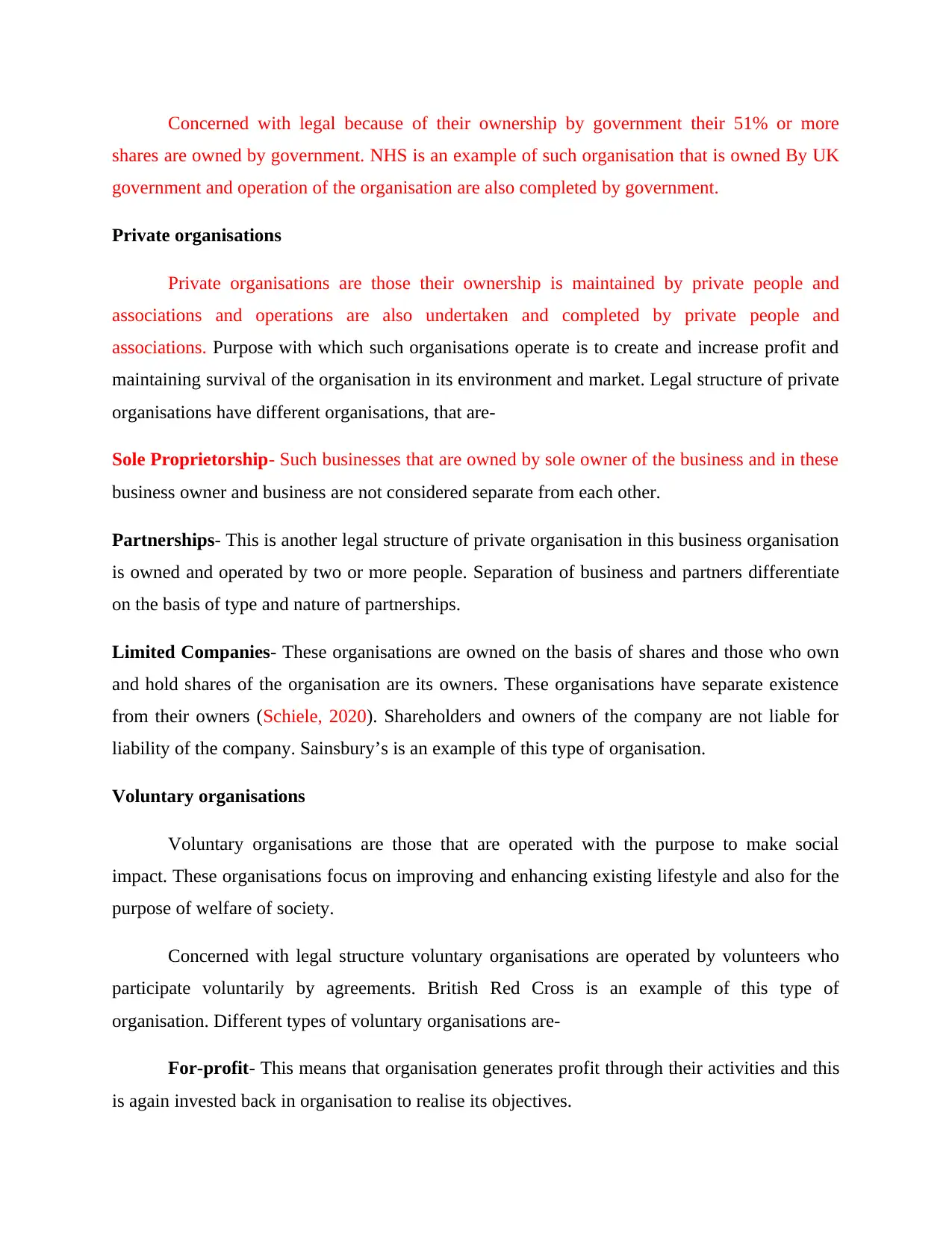
Concerned with legal because of their ownership by government their 51% or more
shares are owned by government. NHS is an example of such organisation that is owned By UK
government and operation of the organisation are also completed by government.
Private organisations
Private organisations are those their ownership is maintained by private people and
associations and operations are also undertaken and completed by private people and
associations. Purpose with which such organisations operate is to create and increase profit and
maintaining survival of the organisation in its environment and market. Legal structure of private
organisations have different organisations, that are-
Sole Proprietorship- Such businesses that are owned by sole owner of the business and in these
business owner and business are not considered separate from each other.
Partnerships- This is another legal structure of private organisation in this business organisation
is owned and operated by two or more people. Separation of business and partners differentiate
on the basis of type and nature of partnerships.
Limited Companies- These organisations are owned on the basis of shares and those who own
and hold shares of the organisation are its owners. These organisations have separate existence
from their owners (Schiele, 2020). Shareholders and owners of the company are not liable for
liability of the company. Sainsbury’s is an example of this type of organisation.
Voluntary organisations
Voluntary organisations are those that are operated with the purpose to make social
impact. These organisations focus on improving and enhancing existing lifestyle and also for the
purpose of welfare of society.
Concerned with legal structure voluntary organisations are operated by volunteers who
participate voluntarily by agreements. British Red Cross is an example of this type of
organisation. Different types of voluntary organisations are-
For-profit- This means that organisation generates profit through their activities and this
is again invested back in organisation to realise its objectives.
shares are owned by government. NHS is an example of such organisation that is owned By UK
government and operation of the organisation are also completed by government.
Private organisations
Private organisations are those their ownership is maintained by private people and
associations and operations are also undertaken and completed by private people and
associations. Purpose with which such organisations operate is to create and increase profit and
maintaining survival of the organisation in its environment and market. Legal structure of private
organisations have different organisations, that are-
Sole Proprietorship- Such businesses that are owned by sole owner of the business and in these
business owner and business are not considered separate from each other.
Partnerships- This is another legal structure of private organisation in this business organisation
is owned and operated by two or more people. Separation of business and partners differentiate
on the basis of type and nature of partnerships.
Limited Companies- These organisations are owned on the basis of shares and those who own
and hold shares of the organisation are its owners. These organisations have separate existence
from their owners (Schiele, 2020). Shareholders and owners of the company are not liable for
liability of the company. Sainsbury’s is an example of this type of organisation.
Voluntary organisations
Voluntary organisations are those that are operated with the purpose to make social
impact. These organisations focus on improving and enhancing existing lifestyle and also for the
purpose of welfare of society.
Concerned with legal structure voluntary organisations are operated by volunteers who
participate voluntarily by agreements. British Red Cross is an example of this type of
organisation. Different types of voluntary organisations are-
For-profit- This means that organisation generates profit through their activities and this
is again invested back in organisation to realise its objectives.
Paraphrase This Document
Need a fresh take? Get an instant paraphrase of this document with our AI Paraphraser
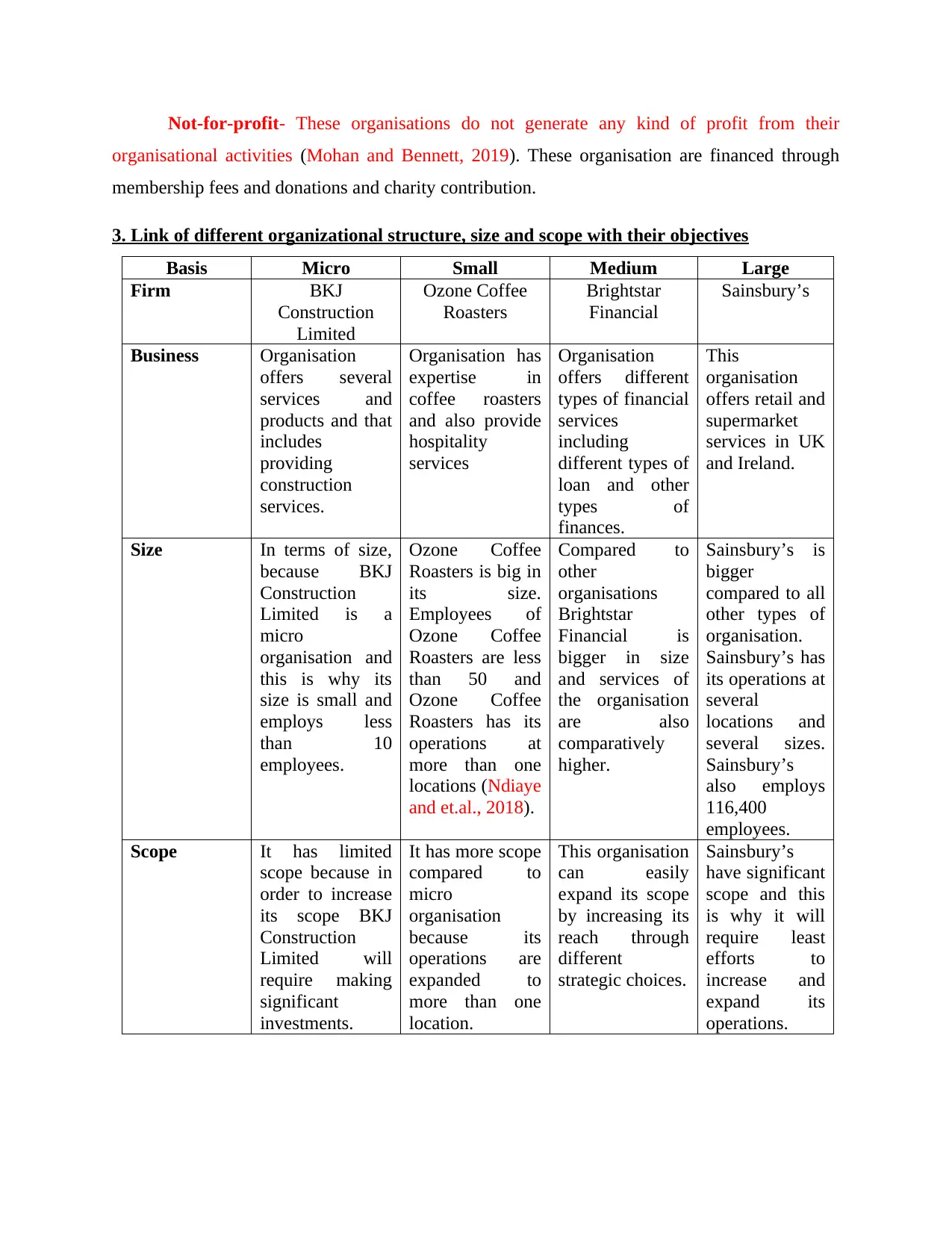
Not-for-profit- These organisations do not generate any kind of profit from their
organisational activities (Mohan and Bennett, 2019). These organisation are financed through
membership fees and donations and charity contribution.
3. Link of different organizational structure, size and scope with their objectives
Basis Micro Small Medium Large
Firm BKJ
Construction
Limited
Ozone Coffee
Roasters
Brightstar
Financial
Sainsbury’s
Business Organisation
offers several
services and
products and that
includes
providing
construction
services.
Organisation has
expertise in
coffee roasters
and also provide
hospitality
services
Organisation
offers different
types of financial
services
including
different types of
loan and other
types of
finances.
This
organisation
offers retail and
supermarket
services in UK
and Ireland.
Size In terms of size,
because BKJ
Construction
Limited is a
micro
organisation and
this is why its
size is small and
employs less
than 10
employees.
Ozone Coffee
Roasters is big in
its size.
Employees of
Ozone Coffee
Roasters are less
than 50 and
Ozone Coffee
Roasters has its
operations at
more than one
locations (Ndiaye
and et.al., 2018).
Compared to
other
organisations
Brightstar
Financial is
bigger in size
and services of
the organisation
are also
comparatively
higher.
Sainsbury’s is
bigger
compared to all
other types of
organisation.
Sainsbury’s has
its operations at
several
locations and
several sizes.
Sainsbury’s
also employs
116,400
employees.
Scope It has limited
scope because in
order to increase
its scope BKJ
Construction
Limited will
require making
significant
investments.
It has more scope
compared to
micro
organisation
because its
operations are
expanded to
more than one
location.
This organisation
can easily
expand its scope
by increasing its
reach through
different
strategic choices.
Sainsbury’s
have significant
scope and this
is why it will
require least
efforts to
increase and
expand its
operations.
organisational activities (Mohan and Bennett, 2019). These organisation are financed through
membership fees and donations and charity contribution.
3. Link of different organizational structure, size and scope with their objectives
Basis Micro Small Medium Large
Firm BKJ
Construction
Limited
Ozone Coffee
Roasters
Brightstar
Financial
Sainsbury’s
Business Organisation
offers several
services and
products and that
includes
providing
construction
services.
Organisation has
expertise in
coffee roasters
and also provide
hospitality
services
Organisation
offers different
types of financial
services
including
different types of
loan and other
types of
finances.
This
organisation
offers retail and
supermarket
services in UK
and Ireland.
Size In terms of size,
because BKJ
Construction
Limited is a
micro
organisation and
this is why its
size is small and
employs less
than 10
employees.
Ozone Coffee
Roasters is big in
its size.
Employees of
Ozone Coffee
Roasters are less
than 50 and
Ozone Coffee
Roasters has its
operations at
more than one
locations (Ndiaye
and et.al., 2018).
Compared to
other
organisations
Brightstar
Financial is
bigger in size
and services of
the organisation
are also
comparatively
higher.
Sainsbury’s is
bigger
compared to all
other types of
organisation.
Sainsbury’s has
its operations at
several
locations and
several sizes.
Sainsbury’s
also employs
116,400
employees.
Scope It has limited
scope because in
order to increase
its scope BKJ
Construction
Limited will
require making
significant
investments.
It has more scope
compared to
micro
organisation
because its
operations are
expanded to
more than one
location.
This organisation
can easily
expand its scope
by increasing its
reach through
different
strategic choices.
Sainsbury’s
have significant
scope and this
is why it will
require least
efforts to
increase and
expand its
operations.
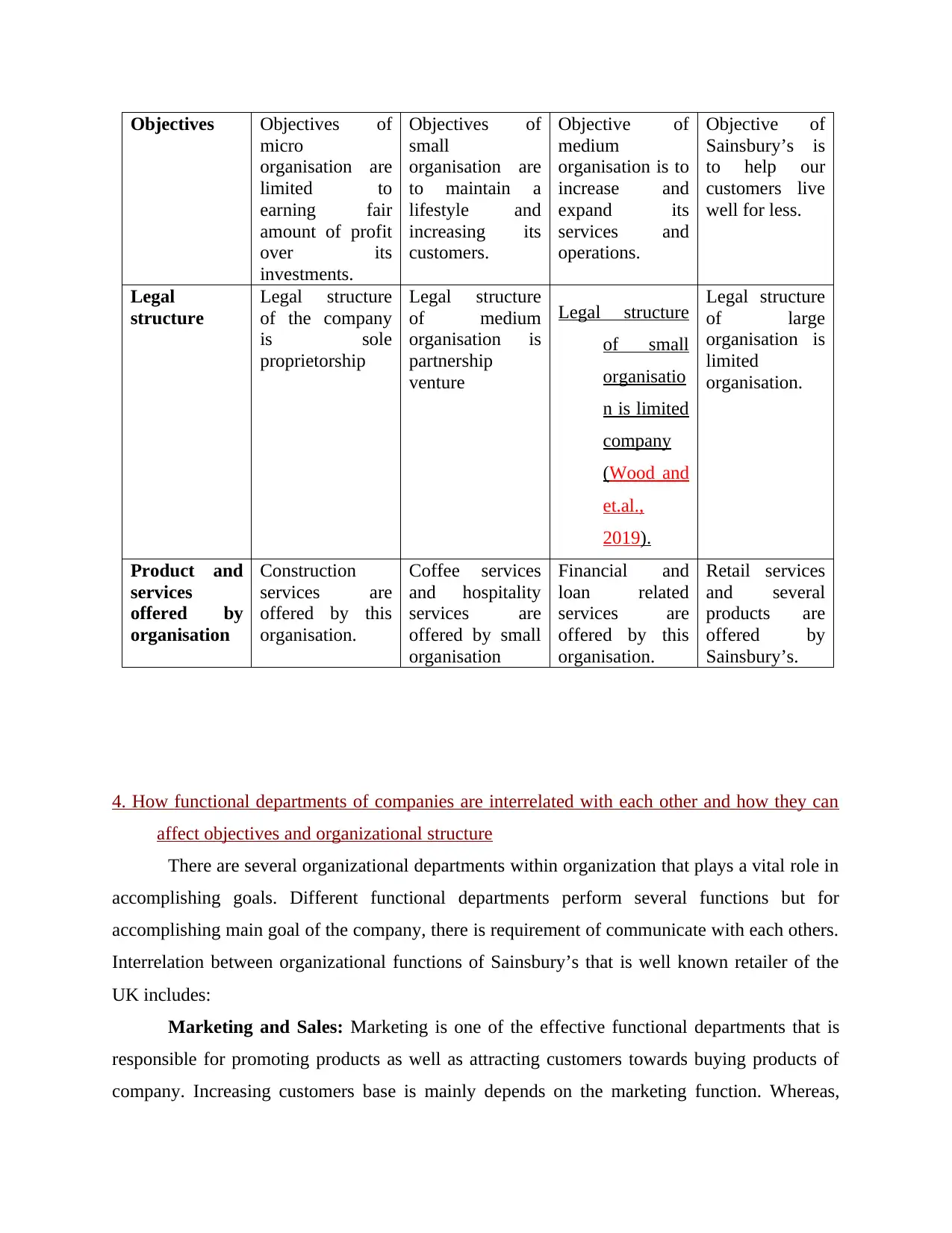
Objectives Objectives of
micro
organisation are
limited to
earning fair
amount of profit
over its
investments.
Objectives of
small
organisation are
to maintain a
lifestyle and
increasing its
customers.
Objective of
medium
organisation is to
increase and
expand its
services and
operations.
Objective of
Sainsbury’s is
to help our
customers live
well for less.
Legal
structure
Legal structure
of the company
is sole
proprietorship
Legal structure
of medium
organisation is
partnership
venture
Legal structure
of small
organisatio
n is limited
company
(Wood and
et.al.,
2019).
Legal structure
of large
organisation is
limited
organisation.
Product and
services
offered by
organisation
Construction
services are
offered by this
organisation.
Coffee services
and hospitality
services are
offered by small
organisation
Financial and
loan related
services are
offered by this
organisation.
Retail services
and several
products are
offered by
Sainsbury’s.
4. How functional departments of companies are interrelated with each other and how they can
affect objectives and organizational structure
There are several organizational departments within organization that plays a vital role in
accomplishing goals. Different functional departments perform several functions but for
accomplishing main goal of the company, there is requirement of communicate with each others.
Interrelation between organizational functions of Sainsbury’s that is well known retailer of the
UK includes:
Marketing and Sales: Marketing is one of the effective functional departments that is
responsible for promoting products as well as attracting customers towards buying products of
company. Increasing customers base is mainly depends on the marketing function. Whereas,
micro
organisation are
limited to
earning fair
amount of profit
over its
investments.
Objectives of
small
organisation are
to maintain a
lifestyle and
increasing its
customers.
Objective of
medium
organisation is to
increase and
expand its
services and
operations.
Objective of
Sainsbury’s is
to help our
customers live
well for less.
Legal
structure
Legal structure
of the company
is sole
proprietorship
Legal structure
of medium
organisation is
partnership
venture
Legal structure
of small
organisatio
n is limited
company
(Wood and
et.al.,
2019).
Legal structure
of large
organisation is
limited
organisation.
Product and
services
offered by
organisation
Construction
services are
offered by this
organisation.
Coffee services
and hospitality
services are
offered by small
organisation
Financial and
loan related
services are
offered by this
organisation.
Retail services
and several
products are
offered by
Sainsbury’s.
4. How functional departments of companies are interrelated with each other and how they can
affect objectives and organizational structure
There are several organizational departments within organization that plays a vital role in
accomplishing goals. Different functional departments perform several functions but for
accomplishing main goal of the company, there is requirement of communicate with each others.
Interrelation between organizational functions of Sainsbury’s that is well known retailer of the
UK includes:
Marketing and Sales: Marketing is one of the effective functional departments that is
responsible for promoting products as well as attracting customers towards buying products of
company. Increasing customers base is mainly depends on the marketing function. Whereas,
⊘ This is a preview!⊘
Do you want full access?
Subscribe today to unlock all pages.

Trusted by 1+ million students worldwide
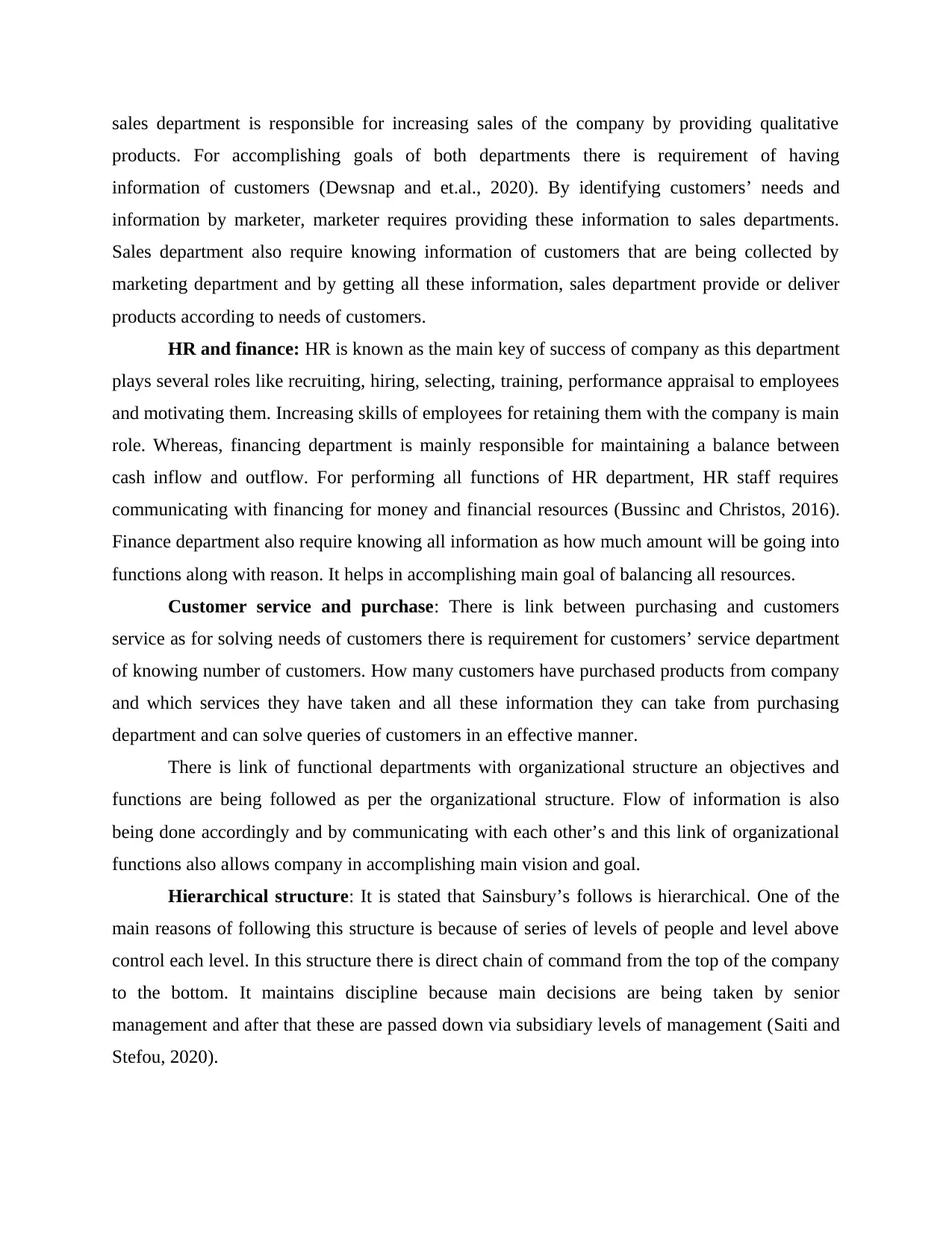
sales department is responsible for increasing sales of the company by providing qualitative
products. For accomplishing goals of both departments there is requirement of having
information of customers (Dewsnap and et.al., 2020). By identifying customers’ needs and
information by marketer, marketer requires providing these information to sales departments.
Sales department also require knowing information of customers that are being collected by
marketing department and by getting all these information, sales department provide or deliver
products according to needs of customers.
HR and finance: HR is known as the main key of success of company as this department
plays several roles like recruiting, hiring, selecting, training, performance appraisal to employees
and motivating them. Increasing skills of employees for retaining them with the company is main
role. Whereas, financing department is mainly responsible for maintaining a balance between
cash inflow and outflow. For performing all functions of HR department, HR staff requires
communicating with financing for money and financial resources (Bussinc and Christos, 2016).
Finance department also require knowing all information as how much amount will be going into
functions along with reason. It helps in accomplishing main goal of balancing all resources.
Customer service and purchase: There is link between purchasing and customers
service as for solving needs of customers there is requirement for customers’ service department
of knowing number of customers. How many customers have purchased products from company
and which services they have taken and all these information they can take from purchasing
department and can solve queries of customers in an effective manner.
There is link of functional departments with organizational structure an objectives and
functions are being followed as per the organizational structure. Flow of information is also
being done accordingly and by communicating with each other’s and this link of organizational
functions also allows company in accomplishing main vision and goal.
Hierarchical structure: It is stated that Sainsbury’s follows is hierarchical. One of the
main reasons of following this structure is because of series of levels of people and level above
control each level. In this structure there is direct chain of command from the top of the company
to the bottom. It maintains discipline because main decisions are being taken by senior
management and after that these are passed down via subsidiary levels of management (Saiti and
Stefou, 2020).
products. For accomplishing goals of both departments there is requirement of having
information of customers (Dewsnap and et.al., 2020). By identifying customers’ needs and
information by marketer, marketer requires providing these information to sales departments.
Sales department also require knowing information of customers that are being collected by
marketing department and by getting all these information, sales department provide or deliver
products according to needs of customers.
HR and finance: HR is known as the main key of success of company as this department
plays several roles like recruiting, hiring, selecting, training, performance appraisal to employees
and motivating them. Increasing skills of employees for retaining them with the company is main
role. Whereas, financing department is mainly responsible for maintaining a balance between
cash inflow and outflow. For performing all functions of HR department, HR staff requires
communicating with financing for money and financial resources (Bussinc and Christos, 2016).
Finance department also require knowing all information as how much amount will be going into
functions along with reason. It helps in accomplishing main goal of balancing all resources.
Customer service and purchase: There is link between purchasing and customers
service as for solving needs of customers there is requirement for customers’ service department
of knowing number of customers. How many customers have purchased products from company
and which services they have taken and all these information they can take from purchasing
department and can solve queries of customers in an effective manner.
There is link of functional departments with organizational structure an objectives and
functions are being followed as per the organizational structure. Flow of information is also
being done accordingly and by communicating with each other’s and this link of organizational
functions also allows company in accomplishing main vision and goal.
Hierarchical structure: It is stated that Sainsbury’s follows is hierarchical. One of the
main reasons of following this structure is because of series of levels of people and level above
control each level. In this structure there is direct chain of command from the top of the company
to the bottom. It maintains discipline because main decisions are being taken by senior
management and after that these are passed down via subsidiary levels of management (Saiti and
Stefou, 2020).
Paraphrase This Document
Need a fresh take? Get an instant paraphrase of this document with our AI Paraphraser
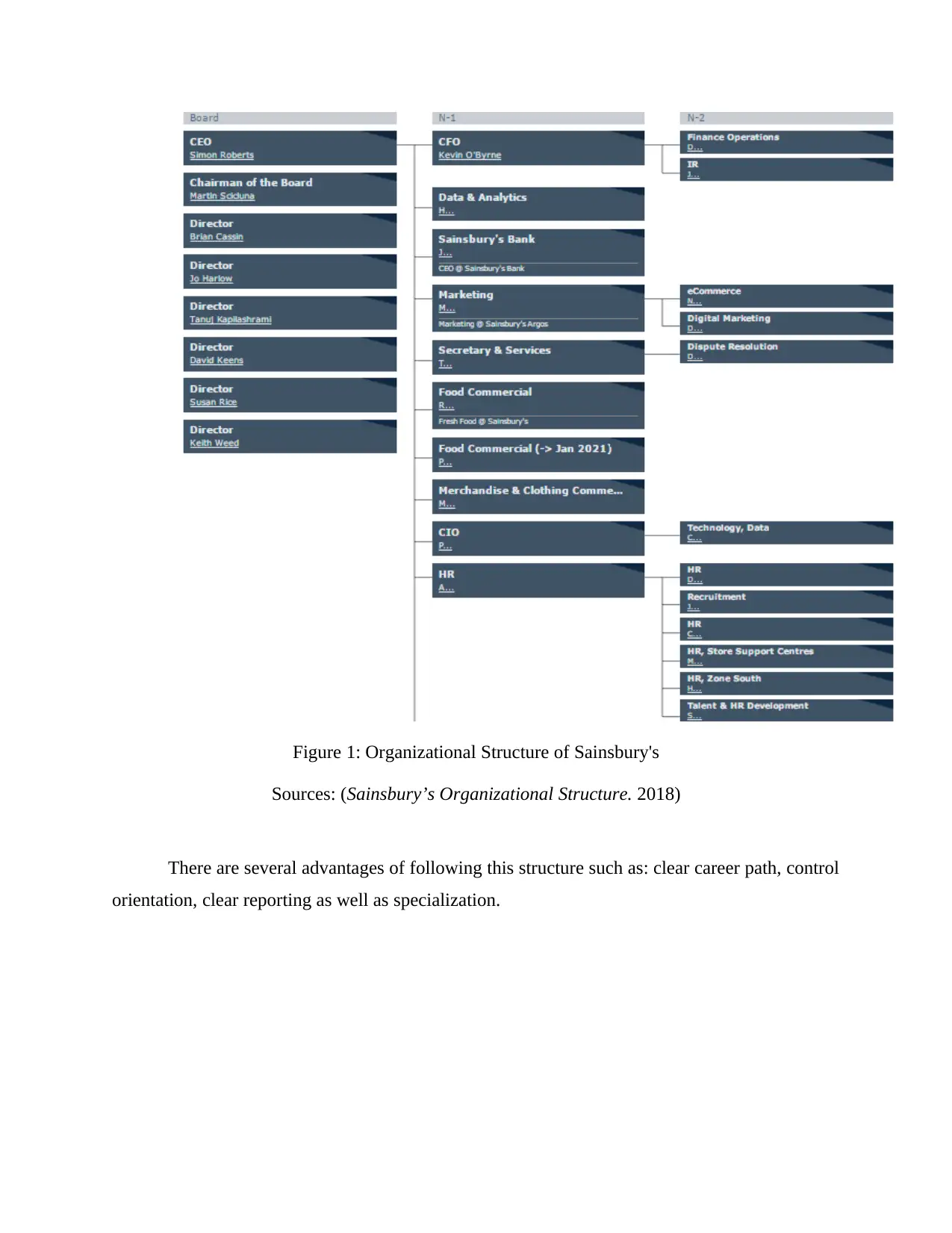
Figure 1: Organizational Structure of Sainsbury's
Sources: (Sainsbury’s Organizational Structure. 2018)
There are several advantages of following this structure such as: clear career path, control
orientation, clear reporting as well as specialization.
Sources: (Sainsbury’s Organizational Structure. 2018)
There are several advantages of following this structure such as: clear career path, control
orientation, clear reporting as well as specialization.
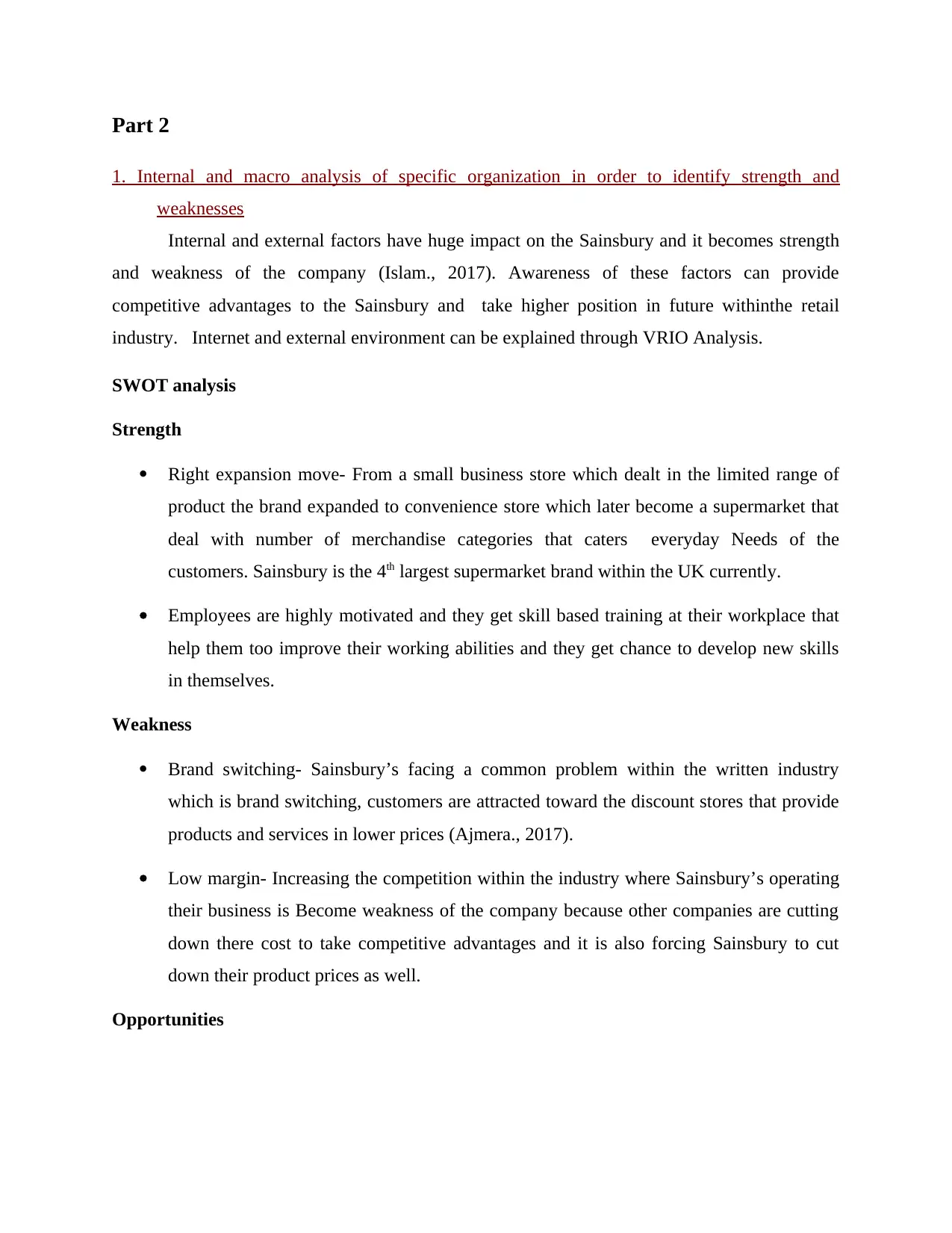
Part 2
1. Internal and macro analysis of specific organization in order to identify strength and
weaknesses
Internal and external factors have huge impact on the Sainsbury and it becomes strength
and weakness of the company (Islam., 2017). Awareness of these factors can provide
competitive advantages to the Sainsbury and take higher position in future withinthe retail
industry. Internet and external environment can be explained through VRIO Analysis.
SWOT analysis
Strength
Right expansion move- From a small business store which dealt in the limited range of
product the brand expanded to convenience store which later become a supermarket that
deal with number of merchandise categories that caters everyday Needs of the
customers. Sainsbury is the 4th largest supermarket brand within the UK currently.
Employees are highly motivated and they get skill based training at their workplace that
help them too improve their working abilities and they get chance to develop new skills
in themselves.
Weakness
Brand switching- Sainsbury’s facing a common problem within the written industry
which is brand switching, customers are attracted toward the discount stores that provide
products and services in lower prices (Ajmera., 2017).
Low margin- Increasing the competition within the industry where Sainsbury’s operating
their business is Become weakness of the company because other companies are cutting
down there cost to take competitive advantages and it is also forcing Sainsbury to cut
down their product prices as well.
Opportunities
1. Internal and macro analysis of specific organization in order to identify strength and
weaknesses
Internal and external factors have huge impact on the Sainsbury and it becomes strength
and weakness of the company (Islam., 2017). Awareness of these factors can provide
competitive advantages to the Sainsbury and take higher position in future withinthe retail
industry. Internet and external environment can be explained through VRIO Analysis.
SWOT analysis
Strength
Right expansion move- From a small business store which dealt in the limited range of
product the brand expanded to convenience store which later become a supermarket that
deal with number of merchandise categories that caters everyday Needs of the
customers. Sainsbury is the 4th largest supermarket brand within the UK currently.
Employees are highly motivated and they get skill based training at their workplace that
help them too improve their working abilities and they get chance to develop new skills
in themselves.
Weakness
Brand switching- Sainsbury’s facing a common problem within the written industry
which is brand switching, customers are attracted toward the discount stores that provide
products and services in lower prices (Ajmera., 2017).
Low margin- Increasing the competition within the industry where Sainsbury’s operating
their business is Become weakness of the company because other companies are cutting
down there cost to take competitive advantages and it is also forcing Sainsbury to cut
down their product prices as well.
Opportunities
⊘ This is a preview!⊘
Do you want full access?
Subscribe today to unlock all pages.

Trusted by 1+ million students worldwide
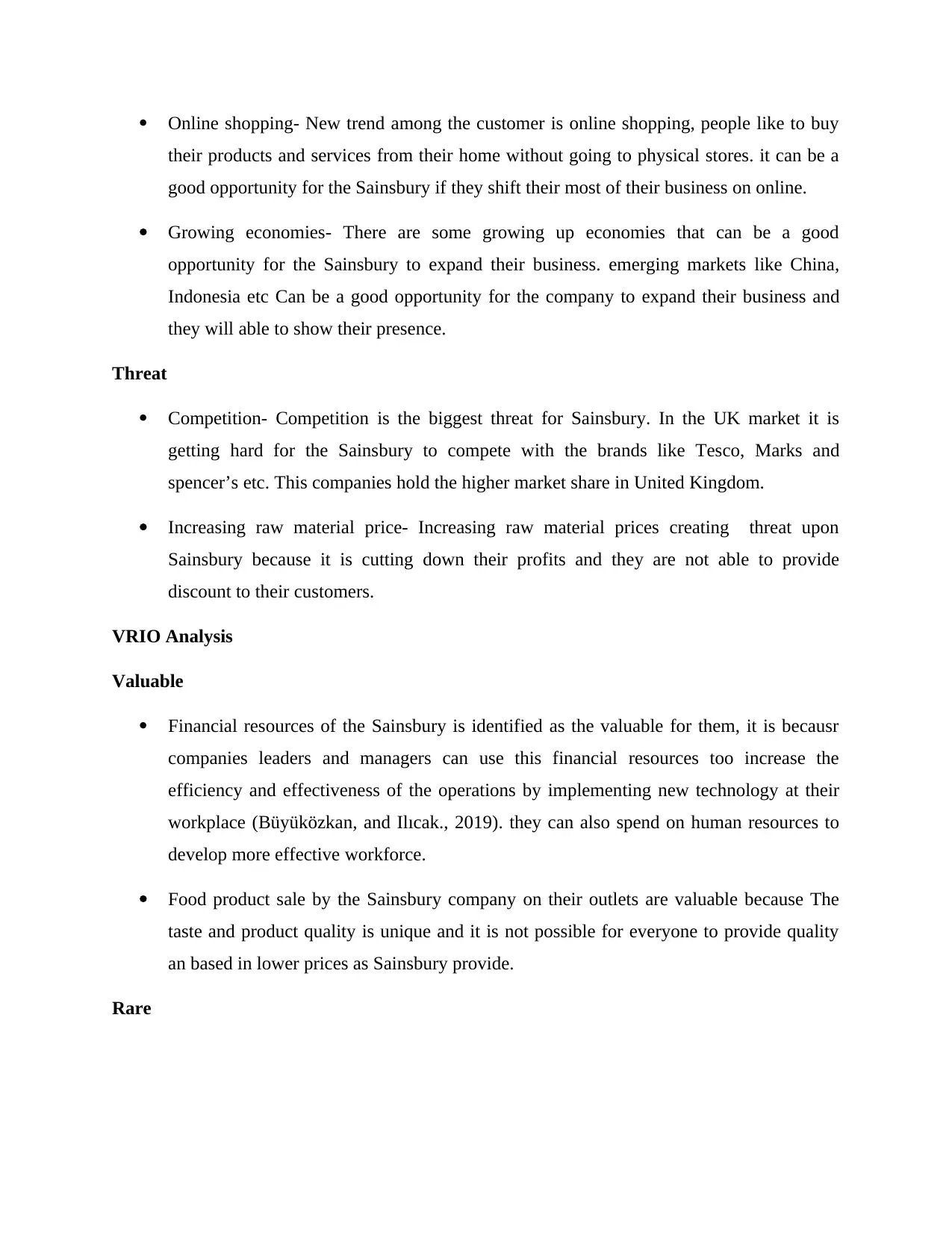
Online shopping- New trend among the customer is online shopping, people like to buy
their products and services from their home without going to physical stores. it can be a
good opportunity for the Sainsbury if they shift their most of their business on online.
Growing economies- There are some growing up economies that can be a good
opportunity for the Sainsbury to expand their business. emerging markets like China,
Indonesia etc Can be a good opportunity for the company to expand their business and
they will able to show their presence.
Threat
Competition- Competition is the biggest threat for Sainsbury. In the UK market it is
getting hard for the Sainsbury to compete with the brands like Tesco, Marks and
spencer’s etc. This companies hold the higher market share in United Kingdom.
Increasing raw material price- Increasing raw material prices creating threat upon
Sainsbury because it is cutting down their profits and they are not able to provide
discount to their customers.
VRIO Analysis
Valuable
Financial resources of the Sainsbury is identified as the valuable for them, it is becausr
companies leaders and managers can use this financial resources too increase the
efficiency and effectiveness of the operations by implementing new technology at their
workplace (Büyüközkan, and Ilıcak., 2019). they can also spend on human resources to
develop more effective workforce.
Food product sale by the Sainsbury company on their outlets are valuable because The
taste and product quality is unique and it is not possible for everyone to provide quality
an based in lower prices as Sainsbury provide.
Rare
their products and services from their home without going to physical stores. it can be a
good opportunity for the Sainsbury if they shift their most of their business on online.
Growing economies- There are some growing up economies that can be a good
opportunity for the Sainsbury to expand their business. emerging markets like China,
Indonesia etc Can be a good opportunity for the company to expand their business and
they will able to show their presence.
Threat
Competition- Competition is the biggest threat for Sainsbury. In the UK market it is
getting hard for the Sainsbury to compete with the brands like Tesco, Marks and
spencer’s etc. This companies hold the higher market share in United Kingdom.
Increasing raw material price- Increasing raw material prices creating threat upon
Sainsbury because it is cutting down their profits and they are not able to provide
discount to their customers.
VRIO Analysis
Valuable
Financial resources of the Sainsbury is identified as the valuable for them, it is becausr
companies leaders and managers can use this financial resources too increase the
efficiency and effectiveness of the operations by implementing new technology at their
workplace (Büyüközkan, and Ilıcak., 2019). they can also spend on human resources to
develop more effective workforce.
Food product sale by the Sainsbury company on their outlets are valuable because The
taste and product quality is unique and it is not possible for everyone to provide quality
an based in lower prices as Sainsbury provide.
Rare
Paraphrase This Document
Need a fresh take? Get an instant paraphrase of this document with our AI Paraphraser
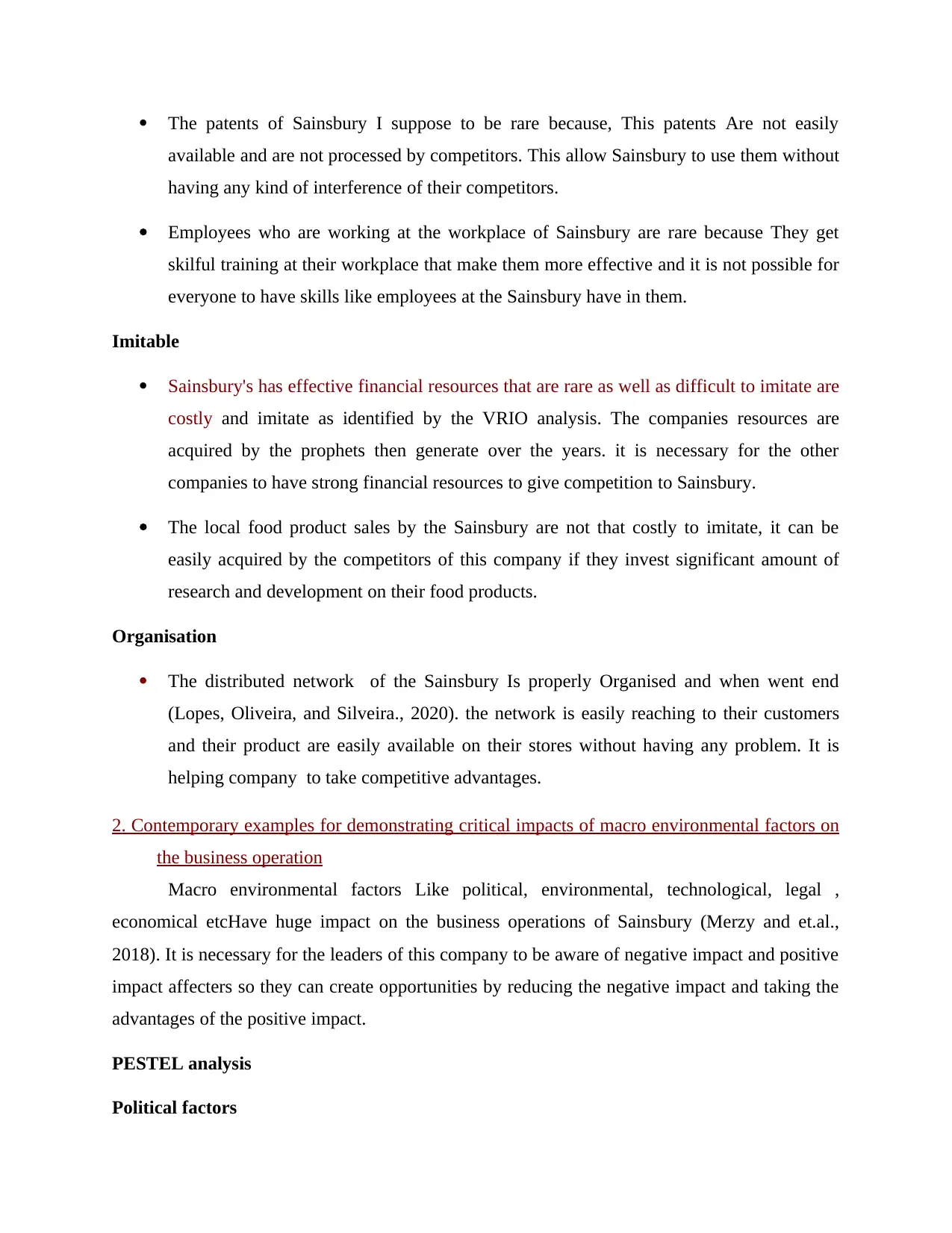
The patents of Sainsbury I suppose to be rare because, This patents Are not easily
available and are not processed by competitors. This allow Sainsbury to use them without
having any kind of interference of their competitors.
Employees who are working at the workplace of Sainsbury are rare because They get
skilful training at their workplace that make them more effective and it is not possible for
everyone to have skills like employees at the Sainsbury have in them.
Imitable
Sainsbury's has effective financial resources that are rare as well as difficult to imitate are
costly and imitate as identified by the VRIO analysis. The companies resources are
acquired by the prophets then generate over the years. it is necessary for the other
companies to have strong financial resources to give competition to Sainsbury.
The local food product sales by the Sainsbury are not that costly to imitate, it can be
easily acquired by the competitors of this company if they invest significant amount of
research and development on their food products.
Organisation
The distributed network of the Sainsbury Is properly Organised and when went end
(Lopes, Oliveira, and Silveira., 2020). the network is easily reaching to their customers
and their product are easily available on their stores without having any problem. It is
helping company to take competitive advantages.
2. Contemporary examples for demonstrating critical impacts of macro environmental factors on
the business operation
Macro environmental factors Like political, environmental, technological, legal ,
economical etcHave huge impact on the business operations of Sainsbury (Merzy and et.al.,
2018). It is necessary for the leaders of this company to be aware of negative impact and positive
impact affecters so they can create opportunities by reducing the negative impact and taking the
advantages of the positive impact.
PESTEL analysis
Political factors
available and are not processed by competitors. This allow Sainsbury to use them without
having any kind of interference of their competitors.
Employees who are working at the workplace of Sainsbury are rare because They get
skilful training at their workplace that make them more effective and it is not possible for
everyone to have skills like employees at the Sainsbury have in them.
Imitable
Sainsbury's has effective financial resources that are rare as well as difficult to imitate are
costly and imitate as identified by the VRIO analysis. The companies resources are
acquired by the prophets then generate over the years. it is necessary for the other
companies to have strong financial resources to give competition to Sainsbury.
The local food product sales by the Sainsbury are not that costly to imitate, it can be
easily acquired by the competitors of this company if they invest significant amount of
research and development on their food products.
Organisation
The distributed network of the Sainsbury Is properly Organised and when went end
(Lopes, Oliveira, and Silveira., 2020). the network is easily reaching to their customers
and their product are easily available on their stores without having any problem. It is
helping company to take competitive advantages.
2. Contemporary examples for demonstrating critical impacts of macro environmental factors on
the business operation
Macro environmental factors Like political, environmental, technological, legal ,
economical etcHave huge impact on the business operations of Sainsbury (Merzy and et.al.,
2018). It is necessary for the leaders of this company to be aware of negative impact and positive
impact affecters so they can create opportunities by reducing the negative impact and taking the
advantages of the positive impact.
PESTEL analysis
Political factors
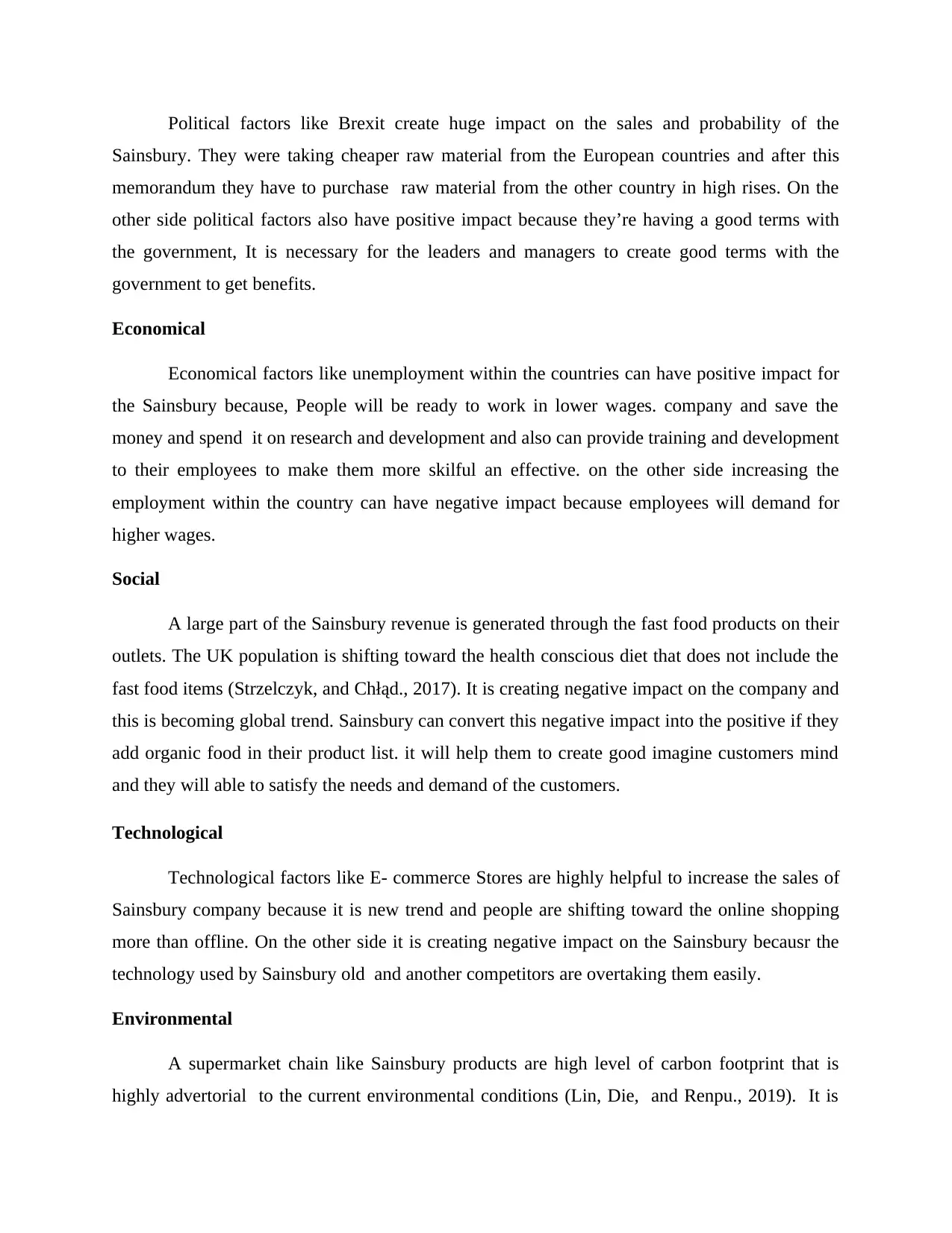
Political factors like Brexit create huge impact on the sales and probability of the
Sainsbury. They were taking cheaper raw material from the European countries and after this
memorandum they have to purchase raw material from the other country in high rises. On the
other side political factors also have positive impact because they’re having a good terms with
the government, It is necessary for the leaders and managers to create good terms with the
government to get benefits.
Economical
Economical factors like unemployment within the countries can have positive impact for
the Sainsbury because, People will be ready to work in lower wages. company and save the
money and spend it on research and development and also can provide training and development
to their employees to make them more skilful an effective. on the other side increasing the
employment within the country can have negative impact because employees will demand for
higher wages.
Social
A large part of the Sainsbury revenue is generated through the fast food products on their
outlets. The UK population is shifting toward the health conscious diet that does not include the
fast food items (Strzelczyk, and Chłąd., 2017). It is creating negative impact on the company and
this is becoming global trend. Sainsbury can convert this negative impact into the positive if they
add organic food in their product list. it will help them to create good imagine customers mind
and they will able to satisfy the needs and demand of the customers.
Technological
Technological factors like E- commerce Stores are highly helpful to increase the sales of
Sainsbury company because it is new trend and people are shifting toward the online shopping
more than offline. On the other side it is creating negative impact on the Sainsbury becausr the
technology used by Sainsbury old and another competitors are overtaking them easily.
Environmental
A supermarket chain like Sainsbury products are high level of carbon footprint that is
highly advertorial to the current environmental conditions (Lin, Die, and Renpu., 2019). It is
Sainsbury. They were taking cheaper raw material from the European countries and after this
memorandum they have to purchase raw material from the other country in high rises. On the
other side political factors also have positive impact because they’re having a good terms with
the government, It is necessary for the leaders and managers to create good terms with the
government to get benefits.
Economical
Economical factors like unemployment within the countries can have positive impact for
the Sainsbury because, People will be ready to work in lower wages. company and save the
money and spend it on research and development and also can provide training and development
to their employees to make them more skilful an effective. on the other side increasing the
employment within the country can have negative impact because employees will demand for
higher wages.
Social
A large part of the Sainsbury revenue is generated through the fast food products on their
outlets. The UK population is shifting toward the health conscious diet that does not include the
fast food items (Strzelczyk, and Chłąd., 2017). It is creating negative impact on the company and
this is becoming global trend. Sainsbury can convert this negative impact into the positive if they
add organic food in their product list. it will help them to create good imagine customers mind
and they will able to satisfy the needs and demand of the customers.
Technological
Technological factors like E- commerce Stores are highly helpful to increase the sales of
Sainsbury company because it is new trend and people are shifting toward the online shopping
more than offline. On the other side it is creating negative impact on the Sainsbury becausr the
technology used by Sainsbury old and another competitors are overtaking them easily.
Environmental
A supermarket chain like Sainsbury products are high level of carbon footprint that is
highly advertorial to the current environmental conditions (Lin, Die, and Renpu., 2019). It is
⊘ This is a preview!⊘
Do you want full access?
Subscribe today to unlock all pages.

Trusted by 1+ million students worldwide
1 out of 16
Related Documents
Your All-in-One AI-Powered Toolkit for Academic Success.
+13062052269
info@desklib.com
Available 24*7 on WhatsApp / Email
![[object Object]](/_next/static/media/star-bottom.7253800d.svg)
Unlock your academic potential
Copyright © 2020–2025 A2Z Services. All Rights Reserved. Developed and managed by ZUCOL.



